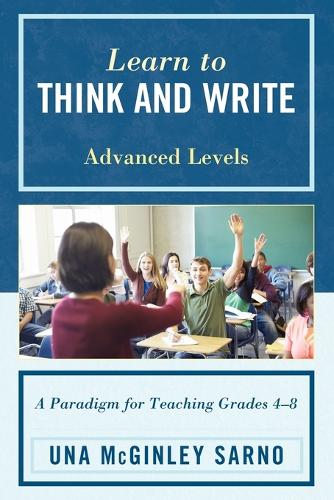
Learn to Think and Write: A Paradigm for Teaching Grades 4-8, Advanced Levels
(Paperback)
Available Formats
Publishing Details
Learn to Think and Write: A Paradigm for Teaching Grades 4-8, Advanced Levels
By (Author) Una McGinley Sarno
Bloomsbury Publishing PLC
Rowman & Littlefield Education
3rd November 2011
United States
Classifications
Professional and Scholarly
Non Fiction
Primary and middle schools
372.1102
Physical Properties
Paperback
192
Width 155mm, Height 232mm, Spine 11mm
304g
Description
The EPILLAW Paradigm is a practical method for developing writing skills. It consists of an original nine-level taxonomy and sequential methodology of listening, speaking, writing and reading. In this method, the development of writing precedes the development of reading. The work consists of two books. In the introductory book, the author explicates the first six levels. The behaviors involved in EPILLAW train the student how to think consecutively and logically. The first three levels establish the concrete assimilation of knowledge; the middle three elevate the students' cognitive ability from the concrete to the abstract cognition of knowledge. Through charting, the students learn the EPILLAW essencing modality that enables them to think abstractly. Lastly, having achieved the skill of abstraction, the student can personalize ideas and, from there, develop writing proficiency. In the advanced book, the author explores the final three levels of the writing process.
Reviews
This text outlines an innovative and exciting approach to the teaching of writing, reading, and comprehension.It offers an excellent guide to a methodology that engages students' senses in a journey towards the comprehension of historical and scientific facts with spelling , vocabulary and grammar as guideposts along the way to developing writing skills. -- George Skau, professor of history (ret), Bergen Community College, NJ
The instruction of sixth grade involves the teaching of writing, reading, and math and developing best practices that will combine the three strands within one lesson. The level V Prcis of the EPILLAW Taxonomy is a perfect example of how a teacher can take advantage of a lesson reflective of composition skills, while assimilating the practice of reading, along with enforcing a childs ability to synthesize language and understand fractions as well. -- Paula Altman Clarke, M.A. doctoral candidate and elementary school teacher
In Learn to Think and Write, Sarno enlivens her excellent and practical text with a world of stories. Students are introduced to stories about a Mexican-American girl and an African boy, readings from classic children's literature, and selections from exciting non-fiction. -- Aileen Gianelli Ph.D, doctoral advisor, Fordham University
This book provides readers with an innovative and very useful methodology for the teaching of language and deals specifically with the skills of listening, speaking, writing and then reading, in an order which is supported by a well-structured and original taxonomy (or EPILLAW Paradigm). I believe this book to be of very considerable benefit to teachers of the particular age group dealt directly with by Dr McGinley Sarno. More importantly, it has many very useful applications to teachers generally. The style is mature and experienced and the book is full of interesting insights. -- Dr. Maureen Killeavy, director, National Teacher Induction Programme PP, University College Dublin
Dr Sarno has selected Mr. Dru's Joshua's Masai Mask as the final test in both her textbooks. This story provides African American male children with appropriate role models and shows how she selected material to appeal to a wide range of school children. As an educator who promotes diverse learning experiences for culturally and linguistically diverse children, Dr. Sarno's contribution is an exemplar of culturally relevant pedagogy. -- Noran L. Moffett Ed.D, Professor, Department of Educational Leadership & Director, Office of Research Initiatives, School of Education, Fayetteville State University
Author Bio
Dr. Una Sarno is an international educator with expertise in teaching elementary, secondary and college students. She received her Ph.D. at University College, Dublin alma mater of James Joyce and was awarded the Doctoral Dissertation of Distinction Award for the year 2010 from the Association of Teacher Educators in the United States.
